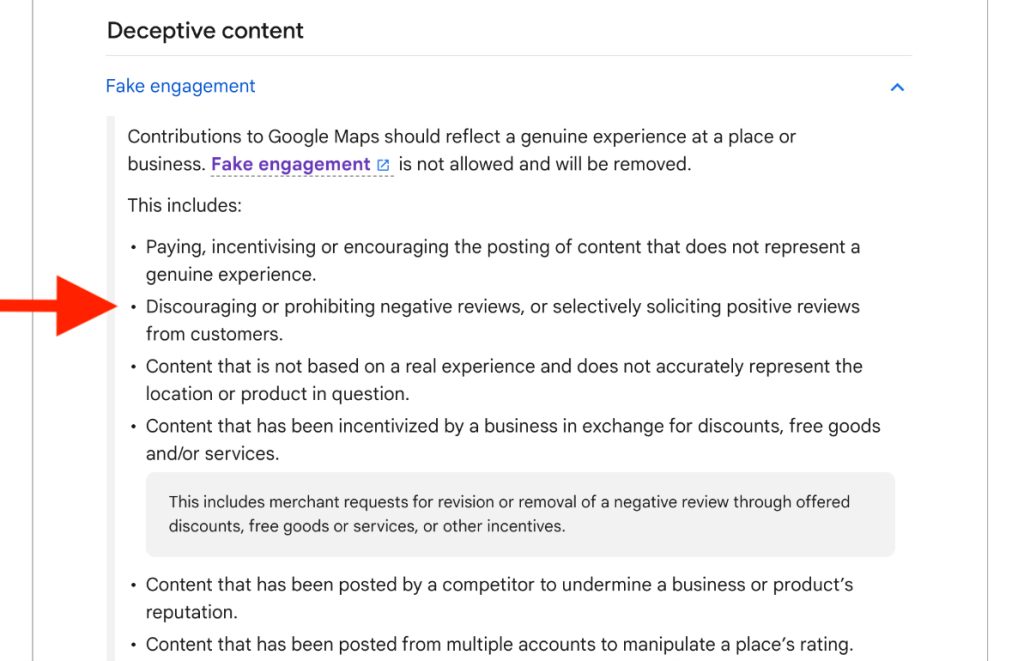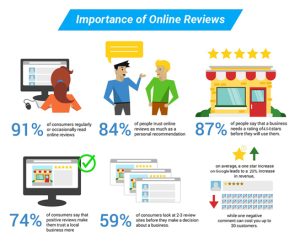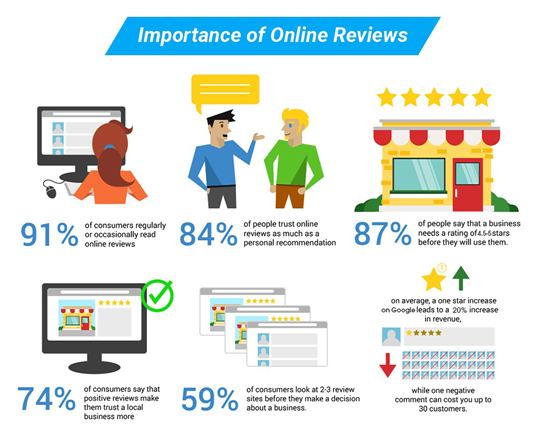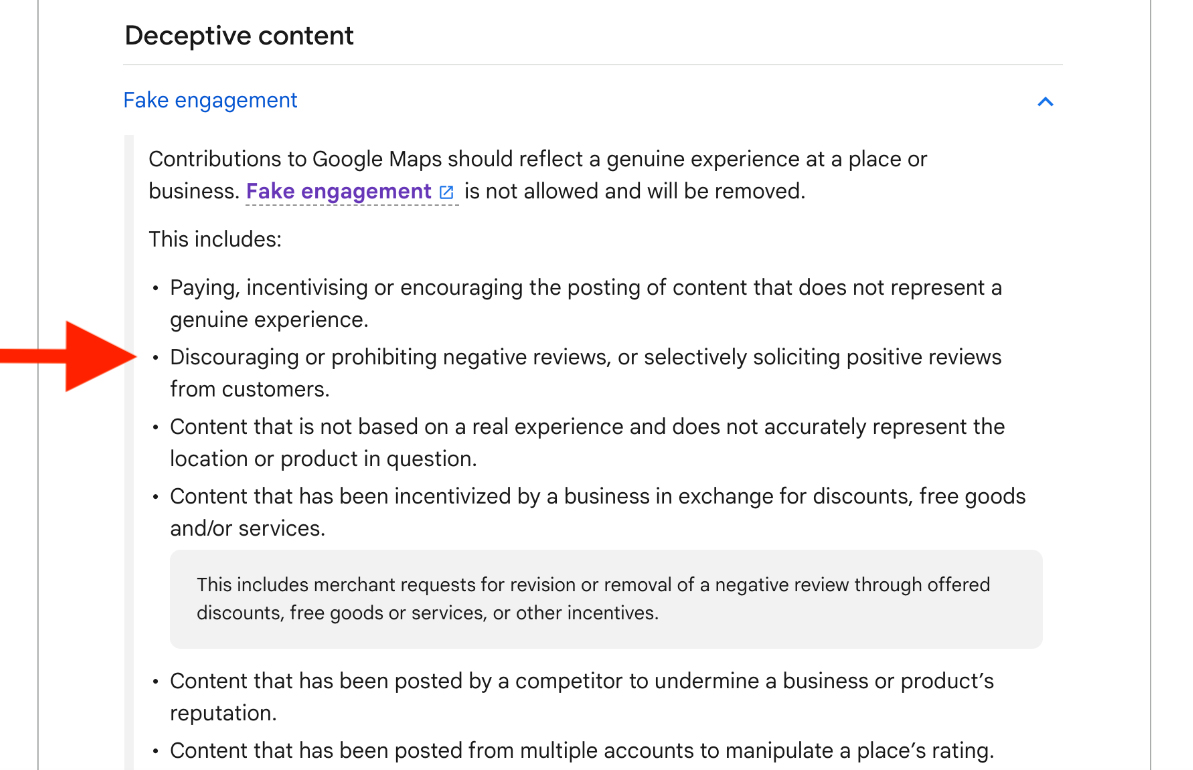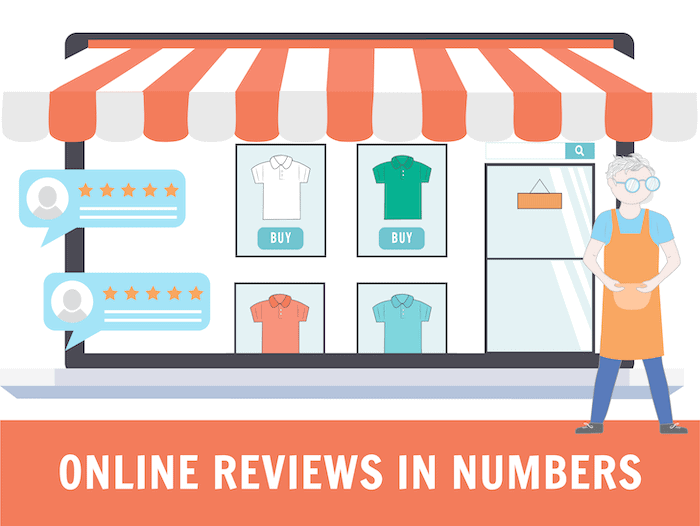The revised Google review guidelines prohibit review gating. As per an official support document, reviews must adhere to these criteria:
Avoid deterring or preventing negative reviews on Google and do not exclusively request positive feedback from clients.
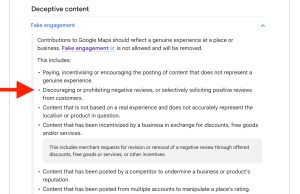
This essentially implies that businesses cannot pre-screen customers before seeking their feedback. You cannot cherry-pick certain individuals (“selectively solicit”) to provide a review, nor can you dissuade customers who might have had an unfavorable experience from posting their thoughts about your establishment.
Like other stipulations in Google’s review guidelines, the “no review gating” rule can be understood in multiple ways, a topic we’ll explore deeper in this article.
Before diving in, let’s define review gating and explore how marketers employ this tactic in an effort to enhance their brand’s standing on Google.
What is Review Gating?
Review gating, often colloquially referred to as “cherry-picking” reviews, is a growing trend among businesses. This strategy entails reaching out to customers with a request for feedback or a survey. This can be done through various channels like email, SMS, landing pages, or social platforms.
Depending on the feedback they provide, customers are directed to either leave a public review on Google if their experience was favorable, or communicate their concerns directly and privately with the business if their experience was less than satisfactory.
In the realm of review gathering and reputation management, “review gating” refers to the tactic where businesses specifically solicit reviews from those customers they believe will provide positive feedback, while simultaneously addressing the concerns of potentially dissatisfied customers in a more private manner.
While platforms such as Yelp explicitly forbid businesses from actively seeking reviews, Google allows businesses to request reviews. However, they must adhere to specific policy and content regulations.
This flexibility in Google’s approach might be a contributing factor to its rapid ascent as the leading review platform. As per recent data on online review trends, Google now surpasses other major platforms like Yelp and Tripadvisor as the primary destination where consumers opt to read and share their feedback about businesses.
How to Interpret Google’s Review Gating Policy Requirement
Industry expert Phil Rozek offers several ways to read Google’s “no review gating” policy:
Interpretation 1: “We don’t care if you only approach happy-ish customers for Google reviews, and we don’t even care exactly how you ask, just as long as you constantly make it clear that customers can leave you a negative review if they feel the need.”
Interpretation 2: “We don’t care who you ask for Google reviews, but you’d better not fixate on their star ratings or what they say in the reviews. So that means don’t be like the hotel that fined guests for leaving bad reviews, don’t tell customers things like, ‘If we haven’t earned your 5-star review yet, please contact us first,’ and don’t use review funnels.”
Interpretation 3: “Ask all customers for reviews, or ask none at all. Don’t let your knowledge of a customer’s happiness influence whether you ask him or her for a review. If you do ask for a review, pretend there’s no such thing as a ‘negative’ review, a ‘positive’ review, or star ratings.”
Interpretation 4: “We’re obligated to tell you that you shouldn’t ‘selectively solicit’ or ‘discourage or prohibit’ reviews. We’re smart enough to define those terms more clearly for you, but we’d rather leave it open to interpretation. That’ll deter some people, and it’ll spook software makers into enforcing our policies for us, and it lets us change our definitions however we want.”
FTC Takes Action Against Review Gating
The Federal Trade Commission (FTC) has recently flagged that multiple online review management firms have been sidestepping the collection or showcasing of unfavorable reviews, actions that breach the FTC Act.
The practice of review gating, whether on Google or other review platforms, is not in alignment with the FTC’s guidelines. While there’s undeniable value in seeking customer reviews, maintaining transparency in showcasing both commendations and criticisms from your clientele not only cultivates trust but also leads to superior review scores.
Research examining consumer purchasing behaviors indicates that the average rating derived from prompted reviews (when businesses solicit feedback) stands at 4.34 out of 5 stars. This is notably higher than the average score for spontaneous reviews, which sits at 3.89 out of 5 stars.
How Can Your Business Address Review Gating?
Regardless of how you interpret Google’s review policies, there are several steps you can take to ensure you’re bolstering your Google reviews, all while adhering to platform-specific terms and regulatory guidelines set by independent authorities:
1. Aim High but Stay Authentic:
Online review data shows that, over the years, customers are leaving more positive reviews. Since 2010, there’s been a 12% increase in the positivity of reviews, with the average rating on Google now standing at 4.3 out of 5 stars. While it’s commendable to aim for a five-star rating, the real value lies in genuine and candid feedback.
2. Embrace Honest Feedback:
Avoid the temptation to over-manage or heavily curate customer reviews. If customer surveys indicate some had a less-than-ideal experience, resist the urge to overshadow or mitigate their feedback. Instead, empower them to voice their opinions freely, in their own tone and style. This demonstrates transparency and a commitment to continuous improvement.
By fostering an environment where all feedback is welcomed, you not only project trustworthiness but also gain valuable insights that can be pivotal for your business growth and customer relations.
Partner with a Tech Expert for Compliance Assurance
Navigating the complex waters of review sites and their policies can be challenging. If you’re unsure about the intricacies of what’s permitted and what’s not when it comes to soliciting reviews, the team at 5 Stars Reputation can guide you. They possess extensive expertise and can offer best practices to ensure you’re compliant while optimizing your review collection initiatives.
One of the standout ways 5 Stars Reputation can assist your review solicitation strategies is through their revamped Reputation Platform. The platform is designed to guarantee compliance as you aim to accumulate a higher quantity and quality of reviews for your business establishments. Their pledge is to offer a tech solution that not only aligns with the guidelines of leading review platforms but also resonates with the growing consumer expectation for genuine, transparent online reviews.

